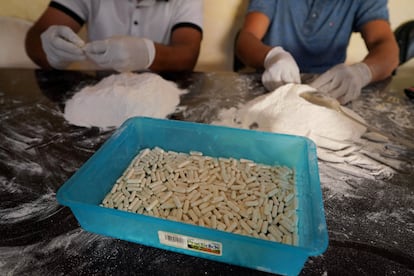The United States seeks to ‘aggressively’ expand its anti-fentanyl operations in Mexico
The Department of Homeland Security aims to boost agent deployment along the southern border for more extensive ‘high-profile’ investigations

The United States Department of Homeland Security (DHS) wants to “aggressively” expand its anti-fentanyl operations in Mexico by 2025. On September 19, the DHS released its Strategy for Combatting Illicit Opioids, detailing how it intends to deploy officers and prosecutors across the country “in furtherance of high-profile investigations targeting Mexican cartels and other transnational criminal organizations in Fiscal Year 2025.” Shortly after Ovidio Guzmán, the son of Joaquín “El Chapo” Guzmán, was extradited to the U.S., the Biden administration is once again pressuring Mexico to take action. President Andrés Manuel López Obrador strongly opposes the U.S. policy of infiltrating and operating within Mexico. When it was revealed in April that the United States Drug Enforcement Administration (DEA) had been spying on the Sinaloa Cartel in Mexican territory, López Obrador said, “It is abusive and arrogant interference, which should not be accepted for any reason.”
These days, the two countries seem to be getting along, though it’s uncertain how long this will last. Mexico recently handed over one of the leaders of Los Chapitos, the Sinaloa Cartel branch led by El Chapo’s sons, at the request of the United States. The Mexican Foreign Ministry also strongly supported the anti-fentanyl fight during the recent meeting of the United Nations General Assembly in New York. The United States has praised these actions, but still wants more. In late September, Attorney General Merrick Garland said he’d like to see the arrest and extradition of the other three leaders of Los Chapitos: Iván Archivaldo, Jesús Alfredo and Joaquín. The U.S. has set its sights on another 20 criminals, including suppliers of drug precursors and weapons dealers. On the same day, the Department of Homeland Security announced its intention to expand operations in Mexico.
According to the DHS strategy document, one objective is to expand the Transnational Criminal Investigative Unit (TCIU), its primary mechanism for achieving law enforcement outcomes abroad, including the interdiction of precursor chemicals, the shuttering of clandestine fentanyl labs, and the arrest of drug traffickers. The DHS strategy emphasizes the need for U.S.-Mexico collaboration in exchanging information and conducting joint investigations, as well as enhancing Mexico’s capacity to investigate and prosecute people involved in transnational criminal activities.
“In Fiscal Year 2025, the Homeland Security Investigations (HSI) office in Mexico will aggressively expand the Mexico TCIU and implement several operational changes to enhance productivity and focus on illicit opioid manufacturing,” states the strategy document. Since the U.S. government’s fiscal year runs from October 1-September 30, this means that the DHS expansion plan will extend into the final stretch of López Obrador’s six-year term, during which he has openly opposed U.S. intervention in Mexico. He eliminated Mexico’s specialized anti-narcotics unit, which had collaborated with the DEA for 25 years. “That unit was infiltrated by criminals,” said López Obrador at the time.
Security-related tensions between the two countries have persisted in recent years. Despite the current period of harmony, past events indicate a challenging situation. López Obrador has taken action to limit the activity of U.S. agents in Mexico, and when reports emerged earlier this year of DEA surveillance of the Sinaloa Cartel, he vowed to address the issue through bilateral negotiations and emphasized his government’s commitment to an independent security policy. “There cannot be foreign agents operating in our country,” he said.
The DHS strategy cites 270 daily deaths from drug overdoses for its new approach, which includes training of foreign personnel to help them tackle the purchase and transportation of chemical precursors. The fentanyl production scenario starts in China, where chemical precursors are manufactured. These precursors do not enter the United States but are instead sent to Mexico and Central America by land and sea. These products are often transported through legitimate routes because they are not controlled in either the country of origin or the country of destination.
To address the ongoing challenges on the U.S. border with Mexico, particularly in the southwest, increased law enforcement presence have been deployed to combat the illegal trafficking of opioids. Efforts are also underway to establish a Cross-Border Financial Crime Center to target money laundering operations associated with drug trafficking. Another goal is to attack the enablers of illicit opioid trafficking, such as the illegal weapons trade, an issue that the Mexican government has acknowledged as contributing to the fentanyl crisis. “The smuggling of firearms from the United States into Mexico provides a mechanism for the cartels to threaten Mexican law enforcement efforts to combat illicit opioid production.”
Sign up for our weekly newsletter to get more English-language news coverage from EL PAÍS USA Edition
Tu suscripción se está usando en otro dispositivo
¿Quieres añadir otro usuario a tu suscripción?
Si continúas leyendo en este dispositivo, no se podrá leer en el otro.
FlechaTu suscripción se está usando en otro dispositivo y solo puedes acceder a EL PAÍS desde un dispositivo a la vez.
Si quieres compartir tu cuenta, cambia tu suscripción a la modalidad Premium, así podrás añadir otro usuario. Cada uno accederá con su propia cuenta de email, lo que os permitirá personalizar vuestra experiencia en EL PAÍS.
¿Tienes una suscripción de empresa? Accede aquí para contratar más cuentas.
En el caso de no saber quién está usando tu cuenta, te recomendamos cambiar tu contraseña aquí.
Si decides continuar compartiendo tu cuenta, este mensaje se mostrará en tu dispositivo y en el de la otra persona que está usando tu cuenta de forma indefinida, afectando a tu experiencia de lectura. Puedes consultar aquí los términos y condiciones de la suscripción digital.









































